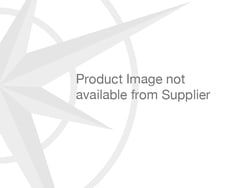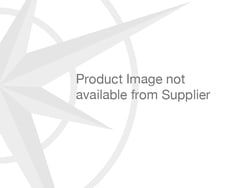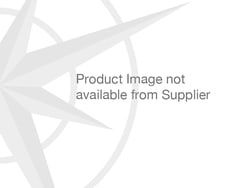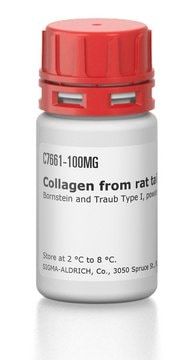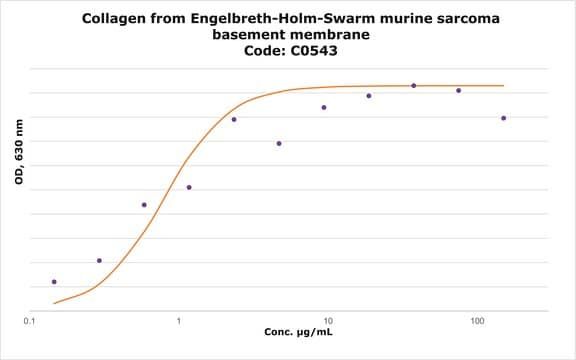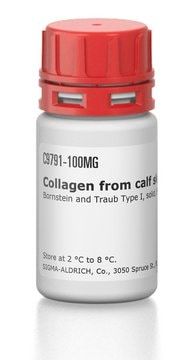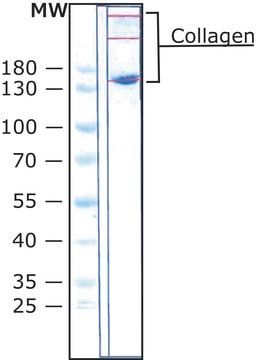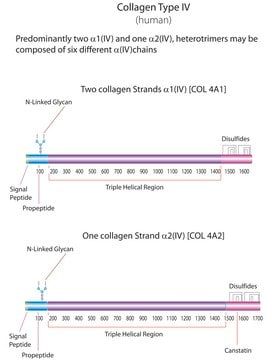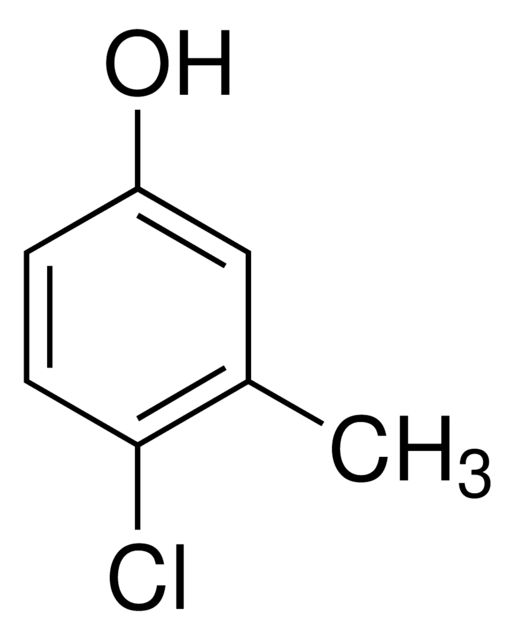C5533
Human Collagen Type IV
from human placenta, powder, suitable for cell culture
Manufacturer: Sigma Aldrich
CAS Number: 9007-34-5
Synonym(S): Collagen Type 4
Select a Size
| Pack Size | SKU | Availability | Price |
|---|---|---|---|
| 5 MG | C5533-5-MG | In Stock | ₹ 23,350.80 |
C5533 - 5 MG
In Stock
Quantity
1
Base Price: ₹ 23,350.80
GST (18%): ₹ 4,203.144
Total Price: ₹ 27,553.944
product name
Collagen from human placenta, Bornstein and Traub Type IV, powder, BioReagent, suitable for cell culture
biological source
human placenta
Quality Level
200
product line
BioReagent
form
powder
packaging
pkg of 5 mg
technique(s)
cell culture | mammalian: suitable
impurities
HIV, hepatitis B and hepatitis C, none detected
solubility
acetic acid: 0.5-2.0 mg/mL (Dissolve for several hours at 2-8 °C, occasionally swirling.)
UniProt accession no.
P02462P08572P29400P53420Q01955Q14031
Other Options
Description
- General description: All collagen molecules are composed of three polypeptide chains arranged in a triple helical conformation, with a primary structure that is mostly a repeating motif with glycine in every third position and proline or 4-hydroxyproline frequently preceding the glycine residue. Type IV collagen occurs only in the basement membranes and contains up to six genetically distinct a-chains. Type IV collagens are localized to the basement membrane and they are network-forming proteins. It is encoded by six different genes: collagen type IV α1 (COL4A1), COL4A2, COL4A3, COL4A4, COL4A5 and COL4A6. Both COL4A1 and COL4A2 genes are mapped to human chromosome 13q34. The proteins encoded by the two genes share 45% homology. They contain: a non-collagenous (NC1) domain, triple-helical collagenous domain and Gly-Xaa-Yaa repeats in common.[1] Both COL4A3 and COL4A4 genes are located on human chromosome 2q36.3.[2] In tissues, type IV collagens are present as procollagens.[3]
- Application: Collagen from human placenta has been used:To solubilize extracellular matrix for surface functionalization.[4]To induce endothelial cell [5] and rat pluripotent cell differentiation.[6]As an adherent in cell migration/invasion assay.[7]To assess the bioelectric effects of quinine on airway epithelial cells.To study the selective toxicity of engineered lentvirus lytic peptides.In particle aggregation assay for the rapid detection of fibronectin, fibrinogen and collagen receptors on Staphylococcus aureus.In a magnesium-dependent, collagen-binding assay during characterization of human lung tumor-associated antigens.
- Biochem/physiol Actions: Type IV collagen maintains cell division and growth.[3] Abnormal collagen secretion affects basement membrane formation.[8] The collagen type IV, α1 (COL4A1) gene is overexpressed in gastric cancer.[9] Mutation in COL4A1 contributes to intracerebral hemorrhage in adults and children.[10] Cerebrovascular disease is resulted due to COL4A1 and COL4A2 mutations.[1] Type IV collagen has been found to play a key role in angiogenesis, neurological diseases and metastasis.During development, collagen IV is ubiquitously distributed in the basement membranes (BMs). During the maturation process, this network gets partially replaced in a remarkably tissue specific manner, defining the BM structure and function. Collagen IV has been shown to bind to platelets, hepatocytes, keratinocytes, endothelial, mesangial, pancreatic cells and some tumor cells. Tissue injury in the autoimmune disease, Goodpasture syndrome, is due to the pathogenic autoantibodies targeting the collagen IV α3 chain. Mutations in the COL4A5 gene are associated with Alport syndrome.
- Caution: This product should be stored desiccated at -20°C, and will retain activity in these conditions for 3 years.
- Preparation Note: This is a lyophilized powder that can be reconstituted in sterile .5 M acetic acid, PBS or water at 1 mg/mL. A PBS solution will be stable for at least one year at -20°C. It was prepared by a modification of the pepsin extraction method of Niyibizi, C. et. al
- Other Notes: Collagen is classified into a number of structurally and genetically distinct types. We use the nomenclature proposed by Bornstein and Traub. Be wary of confusing Sigma-type designations with recognized collagen classification types.
SAFETY INFORMATION
WGK
WGK 1
Flash Point(F)
Not applicable
Flash Point(C)
Not applicable
Personal Protective Equipment
dust mask type N95 (US), Eyeshields, Gloves
Compare Similar Items
Show Difference
product name: Collagen from human placenta, Bornstein and Traub Type IV, powder, BioReagent, suitable for cell culture
biological source: human placenta
Quality Level: 200
product line: BioReagent
form: powder
packaging: pkg of 5 mg
technique(s): cell culture | mammalian: suitable
impurities: HIV, hepatitis B and hepatitis C, none detected
solubility: acetic acid: 0.5-2.0 mg/mL (Dissolve for several hours at 2-8 °C, occasionally swirling.)
UniProt accession no.: P02462P08572P29400P53420Q01955Q14031
product name:
Collagen from human placenta, Bornstein and Traub Type IV, powder, BioReagent, suitable for cell culture
biological source:
human placenta
Quality Level:
200
product line:
BioReagent
form:
powder
packaging:
pkg of 5 mg
technique(s):
cell culture | mammalian: suitable
impurities:
HIV, hepatitis B and hepatitis C, none detected
solubility:
acetic acid: 0.5-2.0 mg/mL (Dissolve for several hours at 2-8 °C, occasionally swirling.)
UniProt accession no.:
P02462P08572P29400P53420Q01955Q14031





